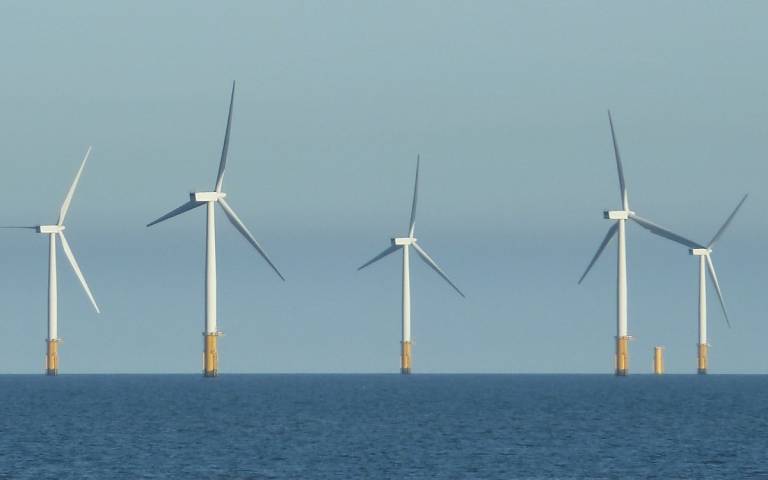UCL-led centre to investigate challenges of net zero future
18 February 2020
New funding for the UK Energy Research Centre (UKERC), which extends across 20 institutions and is hosted by the UCL Energy Institute, will enable engineers, social scientists and natural scientists to conduct vital research into the challenges of a net zero emissions future.

In the fourth phase of UKERC, £22 million will be allocated to research on the decarbonisation of key sectors such as industry, transport and heat, and explore the role of local, national and global changes in energy systems.
UKRI is providing £18 million support for the fourth phase of UKERC, while partners will contribute £4 million. UKERC’s new Director is Dr Robert Gross, from Imperial College London, succeeding Professor Jim Watson (UCL Energy Institute), who has led the centre since 2015.
Professor David Price (UCL Vice-Provost, Research) said: “The UK faces significant challenges in decarbonising our energy systems and ensuring they are robust, sustainable, and can meet the net zero target. Through the work of the UKERC, we are able to bring together academics from across a range of disciplines, to develop holistic solutions to complex problems, and support both industry and government with expertise and innovation.
“By working in partnership – with other universities, with government and with industry – we can make workable, long-term plans for the UK’s move to more sustainable energy generation. I’m proud of the work that UKERC has done over the last five years, and, through this investment, I’m confident that the fourth phase of the project will continue to deliver ground breaking research to make UK energy systems fit for the future.”
Professor Neil Strachan (UCL Energy Institute), lead of the UKERC’s Energy Modelling Hub, said: “We are delighted to host phase four of UKERC with UCL’s Energy Institute. UKERC’s pioneering work on whole energy systems thinking is mirrored in the research that the institute does. Such interdisciplinary energy analysis is critical to underpin the hugely challenging net zero emission target that the UK has legislated and is wrestling with how best to implement.”
Led by UCL, UKERC encompasses 17 universities, the Rutherford Appleton Laboratory, Chatham House and the Oxford Institute for Energy Studies and is funded through the UKRI Energy Programme by UKRI’s Engineering and Physical Sciences Research Council, Natural Environment Research Council and Economic and Social Research Council.
UCL leads on UKERC’s Energy Modelling Hub, and contributes to themes on UK Energy in a Global Context; Local and Regional Energy Systems; Energy, Ecosystems and Resources; and Energy Infrastructure Transitions.
Professor Sir Mark Walport, UK Research and Innovation Chief Executive, said: “Moving the UK to a sustainable, resilient energy system that delivers on our net zero ambitions requires collaboration, better data and expertise across the research and innovation ecosystem.
“UKERC plays an important role in supporting this transition, delivering world-class research, facilitating national and international collaboration and generating evidence that informs real-world decisions.”
UKERC’s research programme will build evidence to inform decisions that shape the UK's transition towards a net zero energy system and economy. It will explore the potential economic, political, social and environmental costs and benefits of energy system change, and consider how these impacts can be distributed equitably. UKERC will also host and curate energy data, map and monitor public engagement, carry out systematic evidence reviews and improve the transparency and understanding of energy models.
Dr Robert Gross, UKERC Director, said: “The UK’s net zero emissions target for 2050 requires urgent and ambitious action now, particularly by government.
“UKERC already has a strong international reputation for ground breaking interdisciplinary research on the transformation of energy systems. This new phase of funding will enable us to implement an exciting new agenda of research and engagement, and to inform the decisions that need to be made over the next five years.”
UKERC will also continue to support the wider energy research community by facilitating engagement with other stakeholders, supporting career development and capacity building, and enhancing international collaboration.
Links
- Professor Neil Strachan’s academic profile
- UCL Energy Institute
- The Bartlett, UCL Faculty of the Built Environment
- UK Energy Research Centre
- UKRI
- UKRI Energy Programme
Image
- Wind farm, Skegness. Credit: Rob Farrow. Source: Wikimedia Commons. Licence: CC BY-SA 2.0
Media contact
Mark Greaves
Tel: +44 (0)20 3108 9485
Email: m.greaves [at] ucl.ac.uk
 Close
Close

